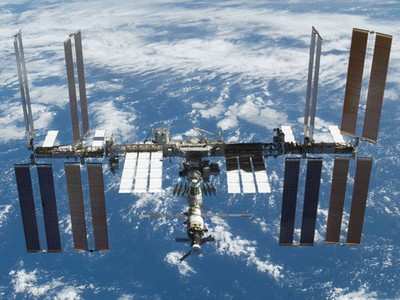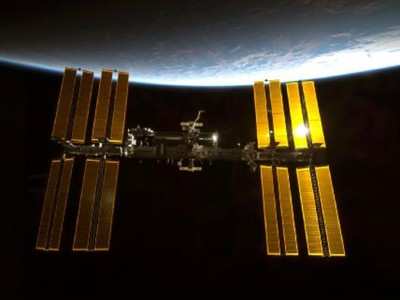Mon, Feb 07, 2011
Top Topics Included Reducing Costs, Increasing Use
The International Space Station partner agencies met Thursday by
videoconference to discuss coordinating the increased use of the
space station as a research laboratory. The agencies want to
continue using the station as a test-bed for exploration and find
innovative ways to reduce costs while increasing use.

NASA Image
The Multilateral Coordination Board (MCB) meeting included
senior representatives from NASA; the Canadian Space Agency (CSA);
the European Space Agency (ESA); the Russian Federal Space Agency
(Roscosmos); and the Japanese Ministry of Education, Culture,
Sports, Science and Technology (MEXT). As the senior management
board, the MCB meets periodically to ensure coordination of station
operations and activities among the partners.
The MCB reaffirmed its commitment to reduce operational costs,
develop an integrated transportation plan and maximize return by
increasing research aboard the station while developing techniques
for future exploration outside Earth's orbit.
The MCB members reviewed ongoing international use of the
station as a laboratory for scientific research, technology
development and testing and educational activities. In the six
months between March and September 2010, the five partner agencies
have provided 195 research opportunities on the orbiting outpost
for 385 investigators from 29 countries. Increasing the station's
use as a unique laboratory is of paramount importance to the
international partners. The International Space Station has proven
to be an important platform for research in biology and
biotechnology, Earth and space science, human physiology, physical
science, technology development and education.

NASA Image
The partners also renewed their commitment to use station
resources and observation capability to assist in humanitarian
needs such as aiding in disaster recovery, tracking oil spills and
monitoring climate change.
All of the partners also recognize the station's role in
inspiring students around the world to learn about science,
technology, engineering and mathematics. More than 30 million
students have participated in human spaceflight through
communications downlinks and interactive experiments with station
astronauts.
The governments of Japan and the Russian Federation have
approved continued ISS operations beyond 2016. The NASA
Authorization Act of 2010 extended operations until at least 2020.
ESA and CSA are working with their respective governments to reach
consensus about the continuation of the station.
More News
The Industry Continues to be Rocked By Some Questionable Operations Recent investigations and a great deal of data has resulted in ANN’s SportPlane Resource Guide’s rep>[...]
Make Sure You NEVER Miss A New Story From Aero-News Network Do you ever feel like you never see posts from a certain person or page on Facebook or Instagram? Here’s how you c>[...]
Visual Approach Slope Indicator (VASI) An airport lighting facility providing vertical visual approach slope guidance to aircraft during approach to landing by radiating a directio>[...]
Airport Marking Aids Markings used on runway and taxiway surfaces to identify a specific runway, a runway threshold, a centerline, a hold line, etc. A runway should be marked in ac>[...]
Aero Linx: The Skyhawk Association The Skyhawk Association is a non-profit organization founded by former Skyhawk Pilots which is open to anyone with an affinity for the A-4 Skyhaw>[...]
 Unfortunate... ANN/SportPlane Resource Guide Adds To Cautionary Advisories
Unfortunate... ANN/SportPlane Resource Guide Adds To Cautionary Advisories ANN FAQ: Turn On Post Notifications
ANN FAQ: Turn On Post Notifications ANN's Daily Aero-Term (04.29.24): Visual Approach Slope Indicator (VASI)
ANN's Daily Aero-Term (04.29.24): Visual Approach Slope Indicator (VASI) ANN's Daily Aero-Term (04.28.24): Airport Marking Aids
ANN's Daily Aero-Term (04.28.24): Airport Marking Aids ANN's Daily Aero-Linx (04.28.24)
ANN's Daily Aero-Linx (04.28.24)




